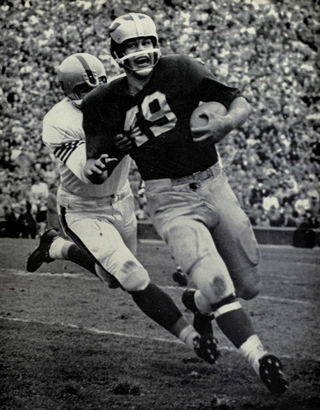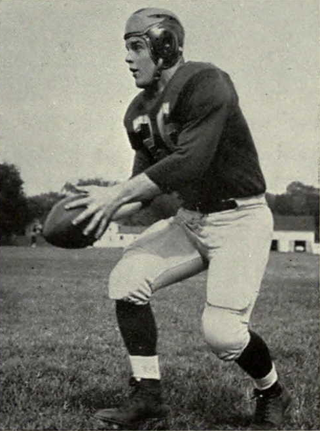
Richard Max Leach is an American former college football player and professional baseball player.
Scott Thomas Dreisbach Jr. is a former American football quarterback.

Robert J. Ptacek, Jr. is a former professional American and Canadian football player. He played college football at the halfback and quarterback positions for the University of Michigan from 1956 to 1958. He later played professional football in the National Football League (NFL) for the Cleveland Browns in 1959 and in the Canadian Football League (CFL) for the Saskatchewan Roughriders from 1960 to 1965. He was a CFL All-Star in 1964 as a defensive back and an All-Western Conference linebacker in 1961.

The 1982 Michigan Wolverines football team was an American football team that represented the University of Michigan in the 1982 Big Ten Conference football season. In their 14th season under head coach Bo Schembechler, the Wolverines compiled an 8–4 record, won the Big Ten championship, lost to UCLA in the 1983 Rose Bowl, and outscored all opponents by a total of 345 to 204.
Steve Smith is a former American football quarterback. He was the starting quarterback for the University of Michigan Wolverines from 1981 to 1983. He also played in the Canadian Football League (CFL) for the Montreal Concordes in 1984 and the Ottawa Rough Riders in 1985.

Louis Granville Baldacci is a former American football player. He played college football for the University of Michigan from 1953 to 1955 and was the starting quarterback for the 1953 and 1954 Michigan Wolverines football teams. He was selected by the Pittsburgh Steelers in the 1956 NFL Draft and played ten games as a halfback in the 1956 NFL season.

The 1986 Michigan Wolverines football team was an American football team that represented the University of Michigan as a member of the Big Ten Conference during the 1986 NCAA Division I-A football season. In its 18th season under head coach Bo Schembechler, the team compiled an 11–2 record, tied for the Big Ten championship, outscored opponents by a total of 379 to 203, and was ranked No. 8 and No. 7, respectively, in the final AP and UPI polls. Late in the season, Schembechler passed Fielding H. Yost as the winningest coach in Michigan football history.

The 1965 Michigan Wolverines football team was an American football team that represented the University of Michigan in the 1965 Big Ten Conference football season. In its seventh year under head coach Bump Elliott, Michigan compiled a 4–6 record, finished in seventh place in the Big Ten, and outscored opponents by a combined total of 185 to 161.

The 1963 Michigan Wolverines football team was an American football team that represented the University of Michigan in the 1963 Big Ten Conference football season. In its fifth year under head coach Bump Elliott, Michigan compiled a 3–4–2 record, tied for fifth place in the Big Ten, and outscored opponents by a total of 131 to 127. The highlight of the season was an upset victory over No. 2 Illinois led by Dick Butkus, the only loss suffered by the 1963 Illinois team.

The 1962 Michigan Wolverines football team was an American football team that represented the University of Michigan in the 1962 Big Ten Conference football season. In its fourth year under head coach Bump Elliott, Michigan compiled a 2–7 record, finished in last place in the Big Ten, and were outscored by opponents by a combined total of 214 to 70.

The 1961 Michigan Wolverines football team represented the University of Michigan in the 1961 Big Ten Conference football season. In its third year under head coach Bump Elliott, Michigan compiled a 6–3 record, finished in sixth place in the Big Ten, and outscored opponents by a combined total of 212 to 163.

The 1960 Michigan Wolverines football team was an American football team that represented the University of Michigan in the 1960 Big Ten Conference football season. In its second year under head coach Bump Elliott, Michigan compiled a 5–4 record, finished in fifth place in the Big Ten, and outscored opponents by a combined total of 133 to 84.

The 1959 Michigan Wolverines football team was an American football team that represented the University of Michigan in the 1959 Big Ten Conference football season. In its first year under head coach Bump Elliott, Michigan compiled a 4–5 record, finished in seventh place in the Big Ten, and was outscored by a combined total of 161 to 122.

The 1955 Michigan Wolverines football team was an American football team that represented the University of Michigan in the 1955 Big Ten Conference football season. In their eighth season under head coach Bennie Oosterbaan, the Wolverines finished in third place in the Big Ten Conference, compiled a 7–2 record, and were ranked No. 12 and No. 13 in the final AP and UPI Polls.
Michael A. Taylor is a former American football player. He played at the quarterback position for the University of Michigan from 1986 to 1989, the final four years of Bo Schembechler's tenure as the school's head football coach. He was Michigan's starting quarterback in 1988 and 1989 and led the Wolverines to Big Ten Conference championships both years. He finished his career at Michigan as the school's all-time leader in passing efficiency.

Dennis M. Brown is a former American football player and coach. He played at the quarterback position for the University of Michigan from 1966 to 1968, the final three years of Bump Elliott's tenure as the school's head football coach. In his first start at quarterback, Brown broke two Big Ten Conference single-game records with 338 yards of total offense and 61 plays. At the end of his playing career at Michigan, he held most of the school's career passing records, including passing yards (2,534), pass attempts (388), and touchdown passes (20). He later served as an assistant football coach at Michigan (1972–1979), West Virginia University (1980–1987), and Arizona State University (1988–1990).
John "Johnny" Wangler is a former American football quarterback. He played for the University of Michigan from 1977 to 1980. During the 1979 and 1980 seasons, Wangler and Anthony Carter formed one of the most successful passing combinations in Michigan Wolverines football history. Wangler's game-ending touchdown pass to Carter in the 1979 Indiana game led Michigan's famed radio announcer, Bob Ufer, to exclaim, "Johnny Wangler to Anthony Carter will be heard until another 100 years of Michigan football is played!" After suffering what appeared to be a career-ending knee injury in the 1979 Gator Bowl, Wangler came back and led the 1980 Michigan Wolverines football team to a Big Ten Conference championship and its first victory in the Rose Bowl Game since the 1964 season. Upon completing his career at Michigan, Wangler ranked second all-time among Michigan quarterbacks in most career passing statistics, including passing yardage, touchdown passes, yards per completion and completion percentage.

Stanton Charles Noskin is a former American football player. He played at the quarterback position for the University of Michigan from 1957 to 1959. He was the starting quarterback for the 1959 Michigan Wolverines football team. He later became a dentist in Skokie, Illinois.

James Andrew 'Mad Dog' Maddock was an American football player. He played at the quarterback position for the University of Michigan from 1954 to 1956. He appeared in all 127 games for the Wolverines during his sophomore, junior and senior years, and led the teams to final Associated Press rankings of No. 15 in 1954, No. 12 in 1955, and No. 19 in 1956.

The promotion of Bump Elliott to head coach in 1959 defined a historical era of the University of Michigan Wolverines football through 1968 when he resigned after that season. Michigan was a member of the Big Ten Conference and played its home games at Michigan Stadium during the Elliott years. During the 10 years in which Elliott served as head football coach, Michigan compiled a record of 51–42–2 (.547) and claimed one Big Ten championship, one Rose Bowl victory, and two Chicago Tribune Silver Football awards for the most valuable player in the Big Ten. However, the Wolverines finished higher than third place in the Big Ten only twice.











